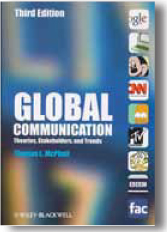My Articles & Presentations
Professional Development
Resume
Services I Provide
Testimonials
How I Work
New Clients
Disaster Preparedness
Global Communication: Theories, Stakeholders, and Trends, 3rd edition
Originally published in Technical Communication, Vol. 59, No. 1
Thomas L. McPhail. (2010). 3rd ed. Chichester, UK: Wiley-Blackwell. [ISBN 978-1-4443-3030-4. 400 pages, including index. US$49.99 (softcover).]
 First published in 2002, this is the third revision of Global Communication: Theories, Stakeholders, and Trends, a scholarly publication about the worldwide distribution of media originating in or controlled by the industrialized nations, in particular the United States. Although not specifically advertised as a textbook, this book does seem targeted at students of communications science, whether they are engaged in formal study or in the informal pursuit of knowledge. Each chapter includes extensive footnotes, as well as an introduction outlining the information to be covered and a summary/conclusion. A long bibliography at the end aids further study of the topic.
First published in 2002, this is the third revision of Global Communication: Theories, Stakeholders, and Trends, a scholarly publication about the worldwide distribution of media originating in or controlled by the industrialized nations, in particular the United States. Although not specifically advertised as a textbook, this book does seem targeted at students of communications science, whether they are engaged in formal study or in the informal pursuit of knowledge. Each chapter includes extensive footnotes, as well as an introduction outlining the information to be covered and a summary/conclusion. A long bibliography at the end aids further study of the topic.
Thomas McPhail, a media studies professor at the University of Missouri, divides the world's nations into three groups: core nations (what used to be called the first world), semiperipheral nations (what was previously the second world—mainly the former socialist countries, most of the Middle East, and the BRIC [Brazil, Russia, India, China] countries), and peripheral nations (everyone else, or the third world). He then outlines several major global communication theories, including Electronic Colonialism Theory (ECT) and World System Theory (WST). ECT describes how foreign communications and cultural products alter the values and habits of people in poorer nations for the benefit of core nations. WST outlines how core nations economically dominate poorer nations and how the export of core nation media and cultural products shapes consumer behavior in the semiperipheral and peripheral countries.
The remainder of the book examines the various facets of international communications (including music, TV, news agencies, the Internet, and global advertising) through the prism of these two theories. In addition, media in several regions (Europe, the Middle East, Asia) are covered by guest contributors who specialize in these areas.
While the chapter titles form a coherent sequence, the individual chapters themselves often seem less focused. Figures sometimes simply repeat in list form information that was already covered in the text, and chapter conclusions occasionally introduce new information. Besides a tighter structure, the book would have benefited from more rigorous copyediting. Numerous spelling and punctuation errors, repeated phrases, and words apparently left behind after revisions make reading unnecessarily cumbersome.
As a theoretical work that addresses large-scale global phenomena and describes multinational corporations, Global Communication is of limited practical use to technical communicators. For readers interested in the influence of core nation media around the globe, however, the book offers a fairly comprehensive overview of the field and its major players. And it concludes with an appeal for investing in peaceful communications instead of warfare—always a welcome sentiment.
Barbara Jungwirth, an STC Senior Member, owns reliable translations LLC (www.reliable-translations.com) where she translates technical documents from German to English and codes for an HIV Web site. She also writes a blog, On Language and Translation (http://reliable-translations.blogspot.com) and posts updates on Twitter (@reliabletran).